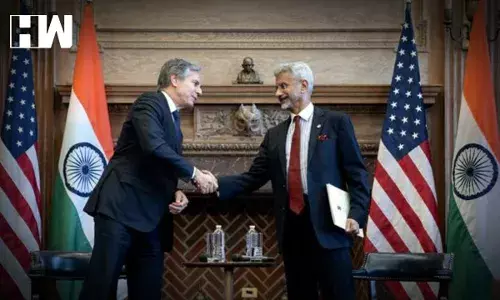New Delhi: People have the right to have opinions about India’s policies, but New Delhi is “equally entitled” to have opinions about them, Foreign Minister S Jaishankar said on Wednesday, in remarks seen as the first official response to the United States’ recent remarks about “human rights abuses” in the country.
Secretary of State Antony Blinken said the US is monitoring some recent “concerning events” in India, including a surge in “human rights abuses” by some government, police, and prison personnel, at a joint news conference after the 2+2 session on Monday. Mr Blinken made the remarks during a joint press conference with Mr Jaishankar, Defence Minister Rajnath Singh, and US Defense Secretary Lloyd Austin.
Mr Bilnken although did not much elaborate. Mr Singh and Mr Jaishankar, who spoke after Blinken at the briefing, did not comment on the human rights issue.
“Look, people are entitled to have views about us. But we are also equally entitled to have views about their views and about the interests, and the lobbies and the vote banks which drive that. So, whenever there is a discussion, I can tell you that we will not be reticent about speaking out,” Mr Jaishankar said at a press briefing Wednesday, adding that the human rights issue was not a topic of discussion during the India US 2+2 ministerial meeting this week.
Mr. Jaishankar stated that if there is a debate, New Delhi will not be afraid to speak up.
“I would tell you that we also take our views on other people’s human rights situation, including that of the United States. So, we take up a human rights issues when they arise in this country, especially when they pertain to our community. And in fact, we had a case yesterday…that’s really where we stand on that,” he said.
In a rare direct rebuke by Washington of New Delhi, Mr Blinken, at the joint press briefing, said, “We regularly engage with our Indian partners on these shared values (of human rights) and to that end, we are monitoring some recent concerning developments in India including a rise in human rights abuses by some government, police and prison officials”.
Anti-conversion legislation have been implemented or are being considered in several Indian states, putting the constitutionally guaranteed right to freedom of belief in jeopardy.
The government approved a citizenship law in 2019, which critics claimed compromised India’s secular constitution by banning Muslim immigration from neighboring countries. Buddhists, Christians, Hindus, Jains, Parsis, and Sikhs who fled Afghanistan, Bangladesh, and Pakistan before 2015 were to be granted Indian citizenship under the law.
In the same year, it revoked the special status of Jammu and Kashmir in a bid to fully integrate the Muslim-majority region with the rest of the country.
Recently Karnataka banned wearing the hijab in classrooms in the state.
As an independent media platform, we do not take advertisements from governments and corporate houses. It is you, our readers, who have supported us on our journey to do honest and unbiased journalism. Please contribute, so that we can continue to do the same in future.

